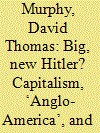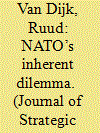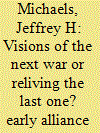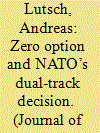|
|
|
Sort Order |
|
|
|
Items / Page
|
|
|
|
|
|
|
| Srl | Item |
| 1 |
ID:
175634


|
|
|
|
|
| Summary/Abstract |
A new biography of Adolf Hitler contends that historians have overlooked Hitler’s obsessive hatred for capitalism, and challenges the dominant historiography by asserting that both the Führer’s own war aims as well as German military resources were focused overwhelmingly on the democratic regimes to his west rather than on the communist one to his east. This essay reviews the argument, critically interrogating the work’s source utilization as well as the implications of this view for historical conceptualization of the aims of Hitler’s war.
|
|
|
|
|
|
|
|
|
|
|
|
|
|
|
|
| 2 |
ID:
175628


|
|
|
|
|
| Summary/Abstract |
Scholars have long seen the Harmel Report as a significant moment in NATO’s history as the Western allies staked out a role for the Alliance in the pursuit of détente. This article examines how and why the Harmel Report’s parallel formula of defence and dialogue endured, focusing on the Alliance’s 1984 reappraisal of East-West relations, the Tindemans Initiative. A snapshot of the Alliance’s ongoing conversation about détente, the Tindemans Initiative illustrated the degree to which détente remained contested, yet also the enduring value of the Harmel Report’s ‘double philosophy’ as a mechanism to retain sufficient public support for the Alliance.
|
|
|
|
|
|
|
|
|
|
|
|
|
|
|
|
| 3 |
ID:
175625


|
|
|
|
|
| Summary/Abstract |
When and why did the United States first contemplate NATO’s enlargement into Eastern Europe? Existing research generally portrays U.S. backing for NATO enlargement as a product of the policy debates and particular beliefs inside the William Clinton administration (1993–2001) starting in the mid-1990s. New evidence, however, shows that U.S. backing for enlargement began earlier, under the preceding George H.W. Bush administration (1989–1993). Moreover, the Bush administration favored enlargement for fundamentally realpolitik reasons, viewing it as a way of sustaining U.S. preeminence and suppressing challengers in post-Cold War Europe. The results carry implications for historiography, foreign policy, and international relations theory.
|
|
|
|
|
|
|
|
|
|
|
|
|
|
|
|
| 4 |
ID:
175623


|
|
|
|
|
| Summary/Abstract |
This special issue examines NATO’s past with an eye to better understanding its present and its future. NATO’s history, now running over seventy years, can no longer be framed in Cold War terms alone. Nor can the organization be understood fully as a post-Cold War institution. Today’s NATO is a product of both of these eras. A reconsideration of NATO’s place in history encourages us to consider NATO’s past, even its contemporary past, from different angles. The articles in this special issue move away from studying NATO’s relationship with any one particular geopolitical event or crisis and instead examine how NATO developed over years and over decades. This effort to draw back the historical lens has had revealing results. It opens new vistas for explaining how NATO thrived and survived for decades, and pondering whether it will survive for many more.
|
|
|
|
|
|
|
|
|
|
|
|
|
|
|
|
| 5 |
ID:
175632


|
|
|
|
|
| Summary/Abstract |
It has been clear for several years now that what NATO purports to stand for and what certain member states practice, do not fully align. From the beginning in 1949, when treaty values and strategic imperatives have been conflicted, the strategic imperatives have almost always, albeit temporarily on an “exceptional” basis, taken precedence over the values. While not new, these tensions today are greater than at any time in NATO’s history. In our view, they could become an existential threat. We use a case study from NATO’s history to examine the case of Turkey today.
|
|
|
|
|
|
|
|
|
|
|
|
|
|
|
|
| 6 |
ID:
175624


|
|
|
|
|
| Summary/Abstract |
This article recounts Russia’s response to NATO’s eastern enlargement. It argues that NATO enlargement was seen as perfectly acceptable in Moscow, as long as it was inclusive of Russia, which would gain in status as America’s key partner and ally. Once it became apparent that Russia would not be invited to join, the narrative changed to active opposition, as Boris Yeltsin sought domestic legitimacy from being perceived as thedefender of the national interest against Western encroachment. The article highlights the fluid nature of so called national interests, which are defined and redefined in ways affording the greatest legitimation to the political elites.
|
|
|
|
|
|
|
|
|
|
|
|
|
|
|
|
| 7 |
ID:
175629


|
|
|
|
|
| Summary/Abstract |
This articles examines the debate, and sometimes lack of debate, over nuclear issues in NATO from the beginning of the alliance to the mid-1960s and reveals how American officials changed their approach to deal with NATO’s nuclear issues. In the 1950s, US officials released only limited information about nuclear weapons that were a part of NATO’s war plans. Gradually, they determined that some of NATO’s major tensions stemmed from their allies’ lack of information about the extent of the US nuclear arsenal and its intended uses. After several halting steps, Secretary of Defense Robert McNamara decided that US interests could be best met by offering the allies a nuclear education.
|
|
|
|
|
|
|
|
|
|
|
|
|
|
|
|
| 8 |
ID:
175626


|
|
|
|
|
| Summary/Abstract |
This paper shows that, during 1991–1992, the George H.W. Bush Administration settled to pursue NATO enlargement in order to ensure both stability in and influence over Europe. Both were necessary subsidiary objectives towards achieving long-term security aims and the medium-term goal of furthering American prosperity. Bush officials concluded that European instability, protectionism, and self-absorption could menace US-led economic globalization. Anchoring NATO at the centre of the post-Cold War European order was seen as the best available response. NATO enlargement would alleviate European security concerns; prevent the emergence of regional security structures that endangered the Alliance; and provide the leverage Washington needed to encourage European participation in America’s global economic order.
|
|
|
|
|
|
|
|
|
|
|
|
|
|
|
|
| 9 |
ID:
175627


|
|
|
|
|
| Summary/Abstract |
Most accounts of NATO enlargement depict it as the implementation of US grand strategy. This article aims to restore agency to the acceding states, specifically the Baltic states who joined the Alliance in 2004. It analyzes the dynamics of competition and cooperation among Estonia, Latvia and Lithuania in the late 1990s and early 2000s during the process of NATO accession. The article demonstrates that both rivalry and joint efforts among the Baltic states in their reforms and lobbying were crucial factors in shaping the outcome. Unlike their inclusion into the EU, NATO membership for the Baltic states seemed improbable, and thus the paper highlights the demand-driven aspect of NATO expansion.
|
|
|
|
|
|
|
|
|
|
|
|
|
|
|
|
| 10 |
ID:
175631


|
|
|
|
|
| Summary/Abstract |
This article examines the early NATO discourse to illuminate ideas about a future war with the Soviet Bloc. World War Two provided an important cognitive script for conceptualizing a Third World War, with the impact of the nuclear ‘revolution’ being less dominant than generally believed. I argue that officials were unable to devise a script in which the Soviet Union could conquer Western Europe and then defeat the United States. Although this inability to achieve “final victory” was believed enough to deter Moscow from aggression, the need to reassure European Allies led NATO to adopt the “forward strategy”.
|
|
|
|
|
|
|
|
|
|
|
|
|
|
|
|
| 11 |
ID:
175633


|
|
|
|
|
| Summary/Abstract |
Seventy-five years after the Red Army won the war in Europe, this victory is marred by two controversies. The first asks: What was the contribution of the Soviets to victory in World War II? The second is a confrontation between East European and Russian war memories: Was Soviet victory a just war or a totalitarian nightmare of suppression, conquest, and terror? This essay reviews these polemics and argues that if put together, these two separate debates have some unintended consequences of how we assess the strategic alliances of the Second World War.
|
|
|
|
|
|
|
|
|
|
|
|
|
|
|
|
| 12 |
ID:
175630


|
|
|
|
|
| Summary/Abstract |
An insufficiently understood paradox surrounded the NATO dual-track decision. This paradox was at the core of an almost classical high impact-low probability scenario which became reality with the INF Treaty of 1987, bringing NATO closer to a crisis of to be or not to be. NATO governments (except France) formally decided in 1979 that new long-range missiles in Europe were necessary but lacked political willpower to exclude the zero option, the possibility that NATO’s missile deployments may be obviated through arms control. The article analyses why this was the case, clarifies why this mattered, and draws policy implications from this crucial episode.
|
|
|
|
|
|
|
|
|
|
|
|
|
|
|
|
|
|
|
|
|